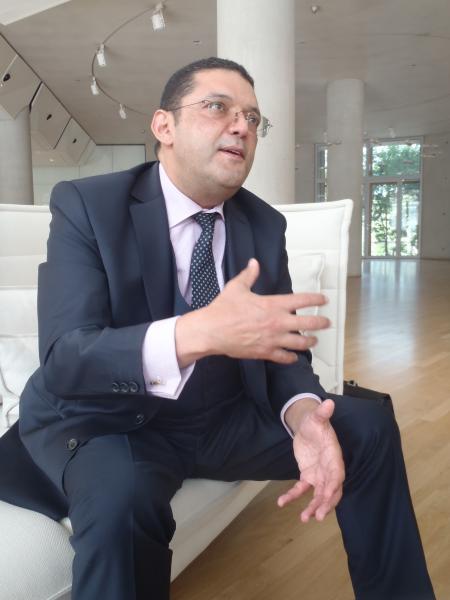An EIB seed accelerator program for Tunisia entrepreneurs creates jobs and helps start-ups get ahead
Despite the name, a seed accelerator has nothing to do with farming and everything to do with helping new businesses grow.
Mondher Khanfir, a French engineer and venture capitalist, runs a seed accelerator firm in his homeland Tunisia. Such firms provide entrepreneurs with investment—typically pre-seed and seed funding that comes at an early stage, as well as training and in some cases open-lab office space—to help them create companies, innovate and expand.
It’s an important role, because the start-up process is complicated and daunting for young companies in the Mediterranean and North Africa. “There is an incredibly big lack of information about economic activities in Tunisia, but also in the whole MENA region and all across Africa,” Khanfir says. “Founders need to be smart, flexible, passionate and able to bear pain.”
It takes around two years for a Mediterranean digital start-up to go from incubation and acceleration to fundraising. “This is a very long time. In fact, it’s killing many potential good startups,” Khanfir says.
Khanfir’s own experience proves his point. In the late 1990s, when he was a young entrepreneur trying to start his first company, he was “shocked at the level of bureaucracy, administrative hurdles and clearance procedures. Everything was a nightmare. Only six months later, I left the country.”

Mondher Khanfir created the first private seed accelerator in Tunisia, WikiStartup, to encourage entrepreneurs
Khanfir finally returned to Tunis for a second attempt to start new businesses. Today one of his companies is WikiStartup, a seed accelerator dedicated to supporting talented young entrepreneurs, showing them that they can stay in their home country and succeed.
Seed accelerators such as WikiStartup play a crucial role for local economies by helping start-ups succeed at home. That’s especially important in Mediterranean markets suffering from political instability or slow economic recovery. Seed firms support the local entrepreneurial ecosystem and first-time job creation in a region where youth unemployment is a big issue.
Targeted help for the private sector
WikiStartup benefitted from a EUR 2 million European Investment Bank seed accelerator programme dedicated to the Mediterranean region. The money comes from the FEMIP Trust Fund, an investment vehicle supported by donations from countries across the EU. (FEMIP stands for Facility for Euro-Mediterranean Investment and Partnership). The FEMIP fund complements the Bank’s other activities in the Mediterranean region by financing upstream technical assistance, regional studies and targeted risk-capital operations supporting innovative private sector companies.
The FEMIP Trust Fund has supported workshops in eight countries, including the US, France, Germany, Turkey and Denmark, to help seed accelerators in the MENA region like WikiStartup engage with other seed accelerators and improve their ability to aid start-ups.
“We were happy to see that all start-up entrepreneurs share the same mind-set—take risks, look for knowledge capital, think out of the box, be very open and creative,” Khanfir says.
Navigating red tape
The EIB’s donor-supported seed accelerator programme helped several start-ups go through a special growth programme.
One other company that received help is Barac, a cybersecurity firm that detects attacks and identifies threats to information-technology infrastructure. The company also uses artificial intelligence to detect fraud. A third company that received assistance is Methania, which helps farmers produce their own renewable energy.
“I see great potential for seed accelerators,” says Khanfir, whose firm hopes to mobilise all the actors in the local ecosystem to launch an ambitious programme that could help up to 500 start-ups a year. “Today we only support 10 to 20 start-ups a year, but there are many people who want to create businesses and jobs. This means we have very fertile ground.”
